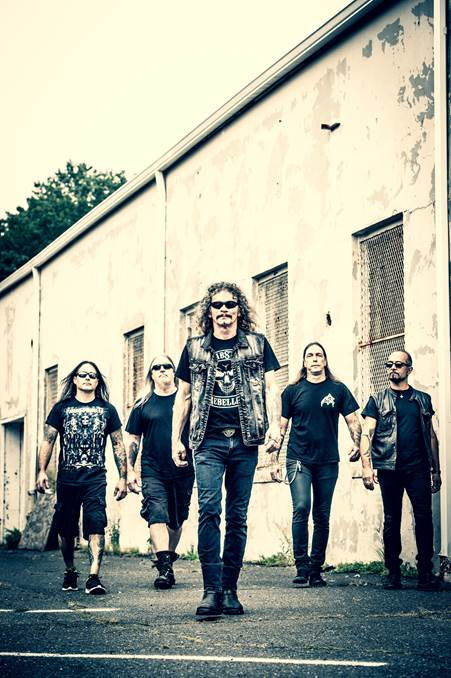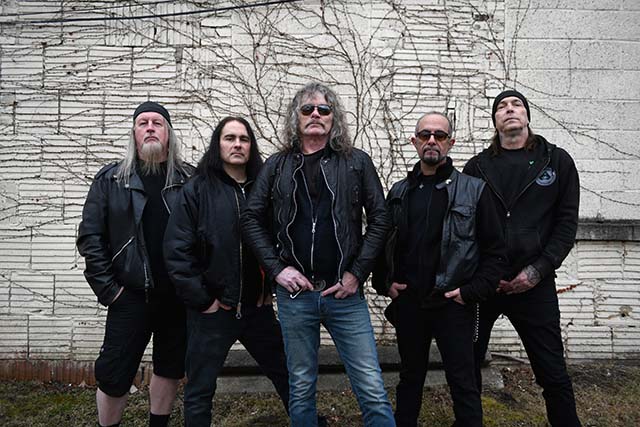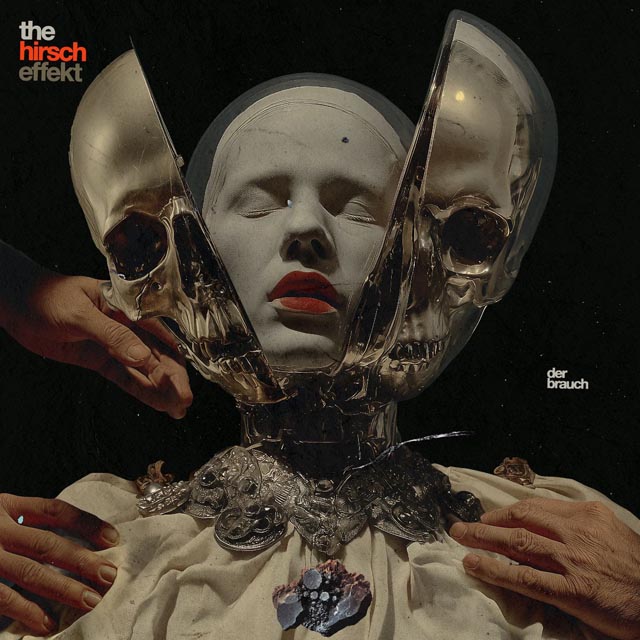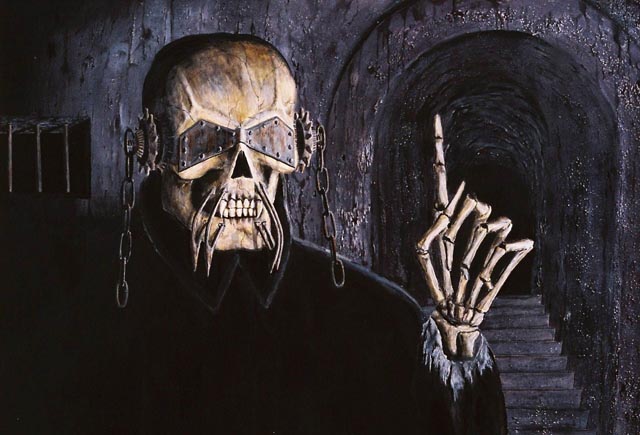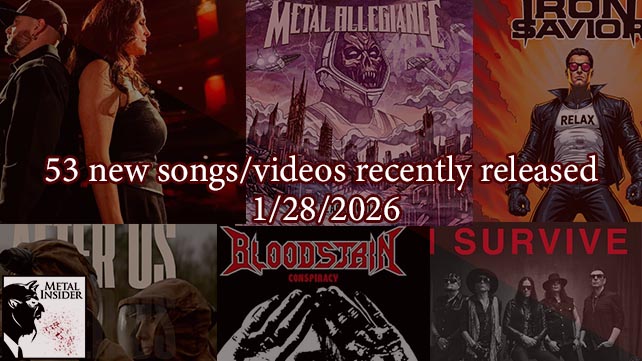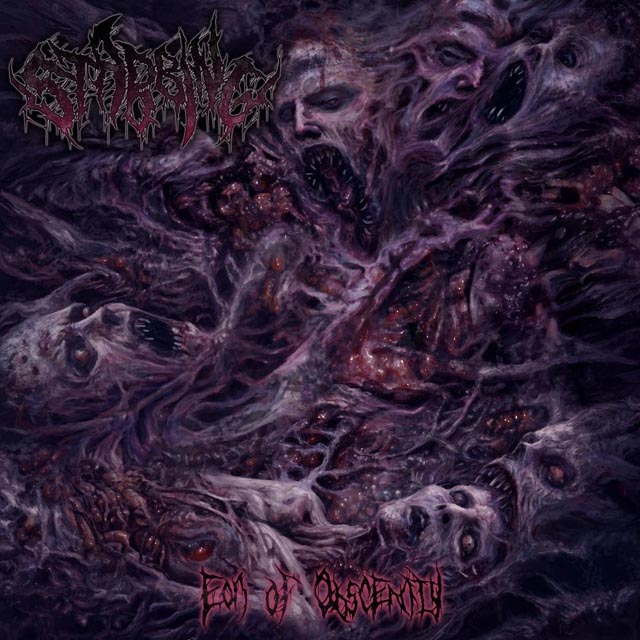
It’s no secret that New Jersey thrash machine Overkill has gone through its fair share of lineup changes since the band’s 1980 inception – no less than 21 players have come and gone over the years, including those with brief early stints and live fill-ins (notably including ex-Anthrax guitarist Dan Spitz for a spell). Vocalist Bobby “Blitz” Ellsworth and bassist D.D. Verni, the only two members remaining from the earliest incarnation of the band, have guided the Overkill name through seminal masterpieces like 1989’s The Years of Decay, and more recently, modern, snarling metal ferocity in the likes of 2014’s White Devil Armory.
As the band is set to release their 18th studio album, Grinding Wheel in November, 2016 marks 25 years removed from the “golden age” of their celebrated first four Megaforce/Atlantic releases, there are those who continue to insist that latter-day Overkill is a long way from what those first four albums were, recorded with guitarist Bobby Gustafson and drummers Rat Skates and Sid Falck (Falck coming in for the third album, 1988’s Under The Influence). Ellsworth respectfully thinks that the naysayers are flat wrong – continued evolution has proved it. As it turns out, that evolution, which included the much-maligned changes in personnel, is what’s enabled Overkill to enjoy the credibility and longevity it’s earned.
“The plan was happening as the music happened,” Ellsworth admits of Overkill’s formative years – a statement that also speaks volumes about the current state of his band. He praises the experimental, rebellious years of the 1980’s, a decade in which fellow thrash acts like Metallica, Megadeth, Slayer, Testament, and the like, spent forging their influential steel. “As something new came on the scene, it set a new benchmark,” he continues. The sense of competition and circular influence can’t be denied when speaking to Ellsworth about bands picking up on what each other was doing.
“I think the band that really set that benchmark was Metallica,” Ellsworth says. “I think they were at the highest level, in regards to that. From where I sit, it wasn’t a planned thing. As time went on, all the rules that were prior, were now broken. I think it’s cool that the “rules” of the scene were broken, and this thing became colossal. And, it still obviously has value – we’re talking 30 years of recording for most of us.”
While Metallica, as a “controlled burn,” musically speaking, may have toned down their reckless abandon over the years, Ellsworth staunchly says that his band never felt that pressure to adapt to what the more commercially successful thrashers were concocting. “I don’t think we felt that pressure, specifically,” he tells. “There were times with certain lineups in our band during the early days, where outside influence actually meant something. I think that D.D. and myself, we changed that by changing members – I’m obviously speaking of the first four records. Some people say, ‘That’s the classic Overkill, that’s what I want to hear.’ Well, that’s fine, but we’re not going to play by somebody else’s rules, and that was coming into play through members of the band, not necessarily any outside sources. I never had a record company come up to me and say, ‘Hey, you have to write a Black Album.’ That was never part of the conversation.”
The topic of current guitarist Dave Linsk can’t be ignored when discussing the evolutionary process and sense of musicality that has become latter-day Overkill. Just as Bobby Gustafson was so integral to the sound of the first four Overkill records, creating a distinguishable tone and style set apart from the James Hetfields or Eric Petersons of the world, so is Linsk on post-1999 Overkill recordings. Ellsworth champions Linsk, who made his Overkill recording debut on 2000’s Bloodletting, as an essential element to the current makeup of the band.
“Somewhere during the 90’s, things changed for us,” he recalls. “The lead guitar was not so prevalent. To some degree, we were working with what we had. We had Sebastian Marino, who was a very good lead player, but, the thing about Dave, is that he can do everything from gritty rock ‘n roll, to almost symphonic stuff. I think this is an element that we’ve brought into our music during the time that Dave’s been here. Dave’s a world-class thrash guitar player; he writes some memorable stuff, some gritty stuff, and whatever you need, Dave can handle it. It’s all about chemistry; whether it be with Dave, or with D.D. and myself, everybody’s’ got to be able to work together – that’ when you start getting good results. When (drummer) Ron Lipnicki came into the band in 2005, he brought this youthful exuberance. When you have that, everybody kind of rises to the same level – that’s priceless, and you can’t put your finger on it until you see it. Over the past few records, we’ve really taken advantage of this, and we’re going to exploit that energy.”
A new worldwide record deal signed with Nuclear Blast in 2015 signifies Overkill’s relevance some 30-plus years on, with that “energy” in no short supply, it seems. Even while working on a new studio album tentatively set for Fall 2016, Ellsworth continues his support of young, unsigned thrash talent. Ellsworth appeared as emcee at the 2016 New Jersey Metalfest this past June, where he took to the stage with ex-Exodus vocalist Rob Dukes’ Generation Kill to perform the Overkill classic “Powersurge” and Black Sabbath’s “War Pigs.” The guy seems to thrive on the promise of an uncharted musical future.
Ellsworth does not look back, in terms of trying to re-create a sense of thrash’s “golden age,” or anything of the sort. He is completely driven to take Overkill to new levels of musical height. He relates a conversation he had with a fan upon the release of Overkill’s 2012 studio offering, The Electric Age, and the fan bringing up the topic of the “good old days.”
“I asked, ‘What do you think of the new record?’ He said, ‘Man, I love this!’ I thought, ‘Doesn’t that really equate itself to the good new days, in as much as what the good old days were. The good old days is about that useful grab – I have it myself. When I hear certain Slayer records, I want to hear that first record I heard. I want to hear, ‘Boy, we want to go back to that.’ But, being a musician, exposed to my own stuff and other people’s stuff, I think that it’s got to evolve and it’s got to progress. So, I think with the past few records, when people say it’s classic Overkill, I think they’re rooted classically, but the presentation is contemporary. It’s really about the value it has right now, as opposed to what’s considered classic, depending on who you talk to.”
It’s important to Ellsworth that he doesn’t make the same record twice, in spite of what even fans might want from a new Overkill record. Not fading into obscurity or becoming a nostalgia act seems deeply personal to him.“Let me tell you, I have notes and post-it’s all over my office, my little home studio, that say ‘Don’t repeat yourself, keep competing,” he proudly admits. “They’re these little idiot motivational signs that say what I am doing is relevant, and what I can do, is something even better. To a certain degree, what you hear on the last few Overkill records is competition with myself; competition with the other guys, not trying to do what we’ve done in the past.”
That self-imposed push forward is what truly excites Ellsworth about Overkill’s future, and what keeps him creatively vital. “Back in the day, everything was exciting from release to release,” he says. “Right now, it’s just as exciting, but in a different way, in regards to current thrash. “I love trying to out-do what we’ve done in the past,” he says. “So, sure, that’s part of the excitement. It’s about today – it’s not about what yesterday was.


